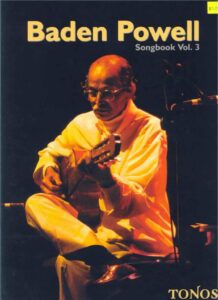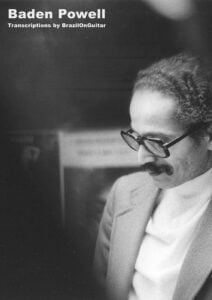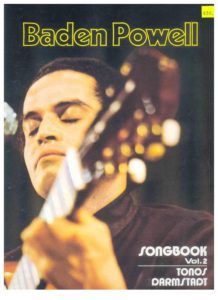Come join us now, and enjoy playing your beloved music and browse through great scores of every level and styles!
Can’t find the songbook you’re looking for? Please, email us at: sheetmusiclibrarypdf@gmail.com We’d like to help you!
Table of Contents
Baden Powell (Sheet Music collection in the smlpdf)

Best Sheet Music download from our Library.
Bach Baden Powell Jesus Bleibet Meine Freude Guitar Tablature Tabs
Baden Powell Manha De Carnaval Guitar Tablature Tabs
Baden Powell – So Por Amor (Guitar arr. sheet music with TABs)
Baden Powell – Samba Do Aviao (Jobim) Guitar arr
Baden Powell – Samba Em Preludio Guitar TAB
Baden Powell – Serenata Do Adeus Guitar TABs
Baden Powell – Songbook – Vol. 2, including the songs:
Babel
Deve ser Amor
Maritima
E de Lei
Tempo feliz
Acalanto das Nonas
Valse No. 1
Retrato Brasileriro
Chara
Fim de Linha
Ultimo Porto (II)
Baden Powell Complete Brazil On Guitar transcriptions sheet music pdf with Tablature

Baden Powell Contemporary solo guitar (Book In Japanese)
Baden Powell Guitar Songbook Volume 3, incl.:
Vorwort
Foreword
Preface
Prefacio
Chanson d’Hiver
Berceuse a Jussara
Simplesmente
Quaquaraquaqua
Casa Velha
Pra Valer
Samba de Pintinho
Cidade Vazia
Samba Triste
Choro para Metronome
Baden Powell Prelude-In-A-Minor
Baden Powell Songbook – Volume 1, including these songs:
Sentimentos
Consolaçao
Canto Do Xango
Tema Triste
Petite Valse
O Cego Aderaldo
Só Por Amor
Valsa Sem Nome
lnsonia

Please, subscribe to our Library.
If you are already a subscriber, please, check our NEW SCORES’ page every month for new sheet music. THANK YOU!

Os Afro-Sambas (Full Album) – Baden Powell
Track list:
0:00 Abertura 6:20 Canto de Ossanha 10:35 Labareda 16:45 Tristeza e Solidão 22:18 Canto do Caboclo de Pedra Preta 25:59 Canto de Xangô 31:53 Bocoché 35:01 Canto de Iemanjá 41:04 Variações Sobre Berimbau 47:09 Tempo de Amor (Samba do Veloso) 51:51 Lamento de Exu
Album recorded in 1966.
Baden Powell (short bio)
Baden Powell de Aquino was born in Varre-e-Sai in the state of Rio de Janeiro, Brazil. His father, a scouting enthusiast, named him after Lord Robert Baden-Powell. When he was three, his family relocated to a suburb in the city of Rio de Janeiro.
The new surroundings proved profoundly influential. His house was a stop for popular musicians during his formative years. He soon started guitar lessons with Jayme Florence (“Meira”), a famous choro guitarist, in the 1940s. He proved a young virtuoso, having won many talent competitions before he was a teenager. At age fifteen, he was already playing professionally, accompanying singers and bands in various styles. As a youngster, he was fascinated by swing and jazz, but his main influences were firmly rooted in the Brazilian guitar canon.
He first achieved notoriety in 1959 by convincing singer/composer Billy Blanco to put lyrics to one of his compositions. The result was “Samba Triste,” which has been covered by many artists, including Stan Getz and Charlie Byrd on their seminal LP Jazz Samba.
In 1962, he met the poet/diplomat Vinícius de Moraes and began a collaboration that yielded some true classics of 1960s Brazilian music. Although bossa nova was the prevailing sound of the times, Baden and Vinicius wanted to transcend the then-fashionable sound by blending Afro-Brazilian sacred and secular music with Rio-style samba.
The most enduring result are their “Afro-Sambas,” released on LP in 1966. During the 1960s, Baden studied advanced harmony with Moacir Santos, released recordings on the Brazilian labels Elenco and Forma, as well as in the French label Barclay and the German label MPS/Saba. His 1966 Tristeza on Guitar is considered by many to be a high point in his career. In addition, he was the house guitarist for Elenco, and Elis Regina’s TV show “O Fino da Bossa”.
In 1968, he partnered with poet Paulo Cesar Pinheiro and produced another series of Afro-Brazilian inspired music, released in 1970 as Os Cantores da Lapinha.
He visited and toured Europe frequently in the 1960s, relocating permanently to France in 1968. In the 1970s, he released many recordings with different labels in Europe and Brazil. His star dimmed somewhat owing to health problems and changing tastes. He spent the 1980s in semi-retirement in France and Germany. Finally, in the 1990s, he and his family moved back to Brazil, where he continued to record and perform. Public recognition of his work came around that time in Brazil. By the end of the 1990s, he converted to evangelical Christianity, to which he credits overcoming his long addictions to alcohol and tobacco. Nevertheless, his health had greatly deteriorated after many years of abuse, and he died of pneumonia on the 26th of September 2000, in Rio de Janeiro.
He is the father of pianist Philippe Baden Powell de Aquino and guitarist Louis Marcel Powell de Aquino.
Playing style
At age 19, Baden Powell decided to stop playing the electric guitar, preferring to concentrate on the classical guitar for the rest of his career. He did record a series of albums with a borrowed steel-string acoustic, but that is as far as he strayed from his main instrument in his adulthood.
An analysis of his repertoire reveals a wide range of interests. It spanned all the idioms of Brazilian popular music of the 20th century: samba, bossa nova, Afro-Bahian ritual music, frevo, choro, folkloric music from northeastern Brazil; even European and Japanese lullabies. Like most musicians growing up in the 1940s and 1950s, he was deeply influenced by jazz, especially Bebop and Swing. He covered Thelonious Monk’s “‘Round Midnight” on two recordings, and Jerome Kern’s “All the Things you Are” on three occasions (including his first solo album).
This upbringing is reflected in his playing style, which shows a fusion of jazz harmonies and classical guitar technique, with a very Brazilian right hand (i.e. the one carrying the rhythm on the guitar). On solo pieces, he could recall Tárrega or play Bach pieces with ease. When playing in a group, he was able to accompany singers with quiet mastery, or let loose and play street samba in sloppy “party” style as if the guitar was another percussion instrument.
Like Monk, he was fond of the minor second interval as a way to “bend” the tonality. However, because of his jazz background, he would rarely physically bend the string, preferring instead to play the minor second using an adjacent open string. Students of his style should note this preference for chord voicings that feature extensions on the open strings as a way of punctuating passages. Other idioms to watch for are the endless variations in rhythm played by the right hand; always within the proper 2/4 samba meter, as well as his tendency to put his “signature” in a fast descending scale with a (slower) ascending arpeggio in the relative key. Another common device that he used in his recordings consisted of his use of vocalise and scat singing, often in unison with the melody line.
He stated that his influences included his first teacher “Meira” (Jayme Florence, 1909-1982), along with master guitarists Dilermando Reis (1916-1977), and Garoto (Anibal Augusto Sardinha, 1915-1955). He also commented about being influenced by the work of Les Paul (Lester William Polfus, 1915-), Django Reinhardt (1910-1953) and Jacques Loussier (1934-).
Baden Powell is featured as accompanist on a handful of big band and samba recordings from the 1950s. He recorded his first solo album in 1959, but it was not released until 1961. His first and second albums feature a selection of jazz standards along with Brazilian hits of the time, plus some original compositions. In 1962, Baden rose to international attention by recording with flatist Herbie Mann and drummer Jimmy Pratt.
By 1963, he was flying solo and fronting small ensembles in Brazil and France. The French labels Barclay and Festival released many of his recordings. In Germany, MPS/Saba released his work with producer Joachim Berendt. In Brazil, he recorded for Elenco, Forma and the Brazilian subsidiary of Philips Records. After a relative drought of new releases in the 1980s, Baden Powell returned to recording studios in Brazil for his final years. These late recordings showcase him playing solo guitar and singing in a relaxed, intimate style, with occasional flurries of his former energetic playing thrown in for good measure.
